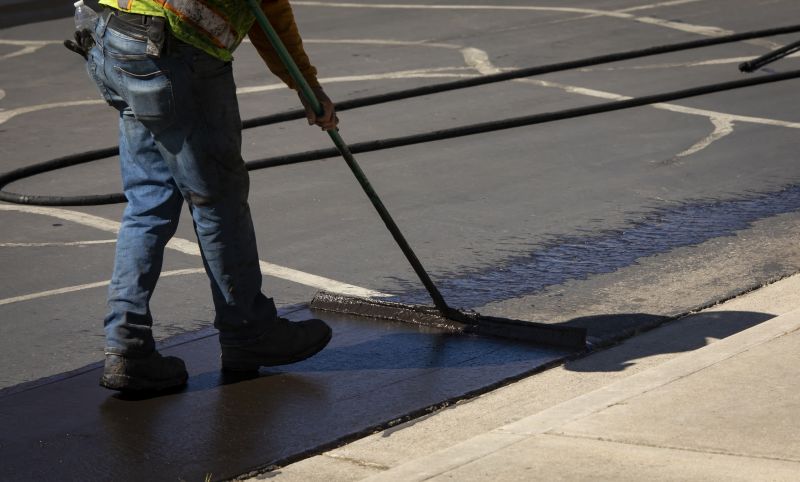Popular Driveway Sealcoating Products For Long-Lasting Protection
Discover highly recommended sealcoating solutions that provide superior protection and improve curb appeal.
 Driveway sealcoatings serve as a protective barrier that helps maintain the integrity and appearance of asphalt surfaces. They can help shield the driveway from damaging elements such as water, UV rays, oil spills, and other chemicals that can cause deterioration over time. Proper sealing can also enhance the visual appeal by providing a uniform, fresh look to the surface. When selecting sealcoating products, it is important to consider the specific needs of your driveway, including its age, condition, and usage patterns.
Driveway sealcoatings serve as a protective barrier that helps maintain the integrity and appearance of asphalt surfaces. They can help shield the driveway from damaging elements such as water, UV rays, oil spills, and other chemicals that can cause deterioration over time. Proper sealing can also enhance the visual appeal by providing a uniform, fresh look to the surface. When selecting sealcoating products, it is important to consider the specific needs of your driveway, including its age, condition, and usage patterns.
Top Overall Option
Premium Asphalt Sealer
A high-quality asphalt sealer that offers durable coverage and a smooth finish. Designed for both DIY enthusiasts and professionals, it provides a protective layer that helps resist water penetration and UV damage. Its easy application process makes it a versatile choice for maintaining various driveway types.
Types of Products For Driveway Sealcoatings
Liquid Asphalt Sealers
Emulsions that form a protective coating over asphalt surfaces, offering ease of application and a smooth finish.
Coal Tar Sealers
Traditional sealers known for their durability and resistance to chemicals, suitable for heavy traffic areas.
Acrylic Sealers
Water-based coatings that provide a glossy finish and good UV resistance, often used for decorative purposes.
Asphalt Emulsions
Thin, easy-to-apply coatings that penetrate and seal small cracks while protecting the surface.
Fast-Drying Sealers
Formulations designed for quick drying times, allowing for faster completion of sealing projects.
Textured Sealers
Coatings that add a slip-resistant surface, ideal for driveways prone to becoming slick.
Crack Fillers
Products formulated to fill and seal small to medium cracks before applying a top coat.
Patching Compounds
Materials used to repair potholes and damaged areas prior to sealing.
Clear Sealers
Transparent coatings that preserve the natural look of asphalt while providing protection.
Eco-Friendly Sealers
Formulations that minimize odor and VOC emissions, suitable for environmentally sensitive areas.
Heavy Duty Sealers
Designed for commercial or high-traffic driveways, offering enhanced durability and resistance.
Low VOC Sealers
Sealants with reduced volatile organic compounds for safer application environments.
Spray-On Sealers
Pre-mixed formulations designed for easy application with spray equipment, ideal for large areas.
Brush-On Sealers
Products suitable for small or detailed areas, offering precise application control.
Polymer-Enhanced Sealers
Sealants that incorporate polymers for improved flexibility and adhesion.
Popular Choices
Widely used for their ease of application and decent protective qualities, suitable for many residential driveways.
Commonly selected for their durability and chemical resistance, often preferred for high-traffic areas.
Chosen for their glossy finish and UV resistance, often used in decorative applications.
Popular among DIY users for their quick turnaround times, enabling faster project completion.
Frequently used as a preparatory step before sealing, helping to address small cracks.
Commonly utilized for repairing potholes and surface damage prior to sealing.
Popular for providing slip resistance, especially in areas prone to wet conditions.
Chosen for preserving the natural look of asphalt while adding a protective layer.
Increasingly favored for their safer application profile and lower emissions.
Preferred for large-scale projects due to their quick and uniform application.
Sealcoating products come in various formulations, including liquid emulsions, coal tar, asphalt-based coatings, and acrylic sealers. Each type offers different benefits and application methods, making it essential to choose the right product for your particular situation. Some products are designed for DIY application, featuring easy-to-use brushes or spray equipment, while others are better suited for professional use with specialized applicators. Proper surface preparation and application techniques are crucial to achieve optimal results and longevity.
In addition to traditional sealers, there are also specialty products such as crack fillers, patching compounds, and textured coatings that can be used in conjunction with sealcoatings to address specific driveway issues. Regular maintenance, including cleaning and timely sealing, can extend the lifespan of your asphalt surface. Always follow manufacturer instructions regarding drying times, application conditions, and safety precautions to ensure the best outcome. Investing in quality sealcoating products can help preserve the driveway's surface and improve its overall appearance for years to come.
Key Buying Considerations
- Surface Compatibility: Ensure the product is suitable for your asphalt type and condition.
- Application Method: Decide whether a brush, spray, or roller application suits your project.
- Drying Time: Consider how quickly the sealer dries to plan your project timeline.
- Durability: Look for products that offer resistance to water, UV rays, and chemicals.
- Coverage Area: Check the estimated coverage per gallon to determine how much you'll need.
- Crack and Pothole Repair: Determine if additional products are needed for repairs prior to sealing.
- Finish Appearance: Choose between matte, semi-gloss, or gloss finishes based on aesthetic preferences.
- Environmental Conditions: Select a product that performs well under your local climate conditions.
- Safety Precautions: Review safety instructions, especially if applying in enclosed or poorly ventilated areas.
- Cost and Budget: Balance quality and coverage to find a product that fits your budget.
- VOC Content: Consider products with lower VOCs if odor or fumes are a concern.
- Brand Reputation: Research reviews and manufacturer reputation for consistent quality.
- Long-Term Maintenance: Think about how the product will hold up over time and future maintenance needs.
- Compatibility with Existing Sealers: Ensure new sealers do not react negatively with previously applied coatings.
- Environmental Conditions: Avoid sealing in extreme temperatures or before rain to ensure proper curing.
This content contains affiliate links. We may earn a commission if you make a purchase through these links, at no additional cost to you.
